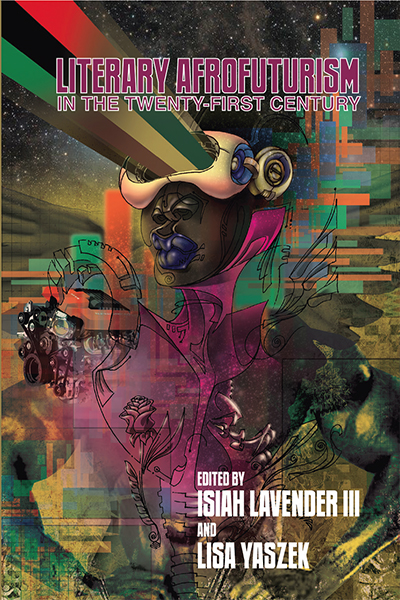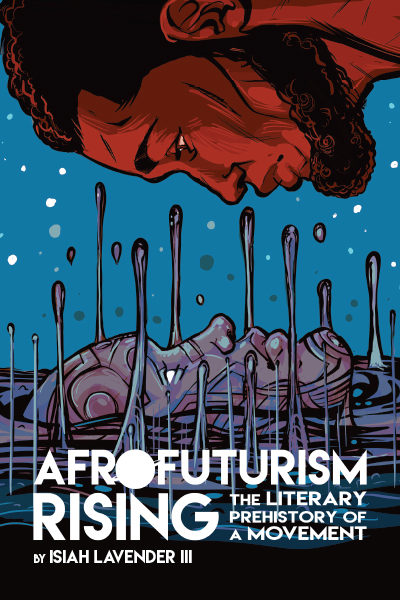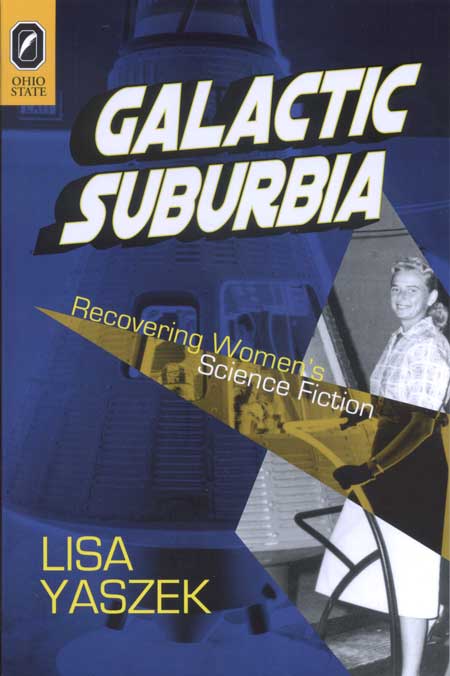A CHOICE 2021 Outstanding Academic Title
Finalist, 2021 Locus Award in nonfiction
“This collection stands out for its respected editors, who are both top-notch scholars in the field, and for its breadth of focus. Lavender and Yaszek have compiled an impressive list of contributors in developing this important conversation about literary Afrofuturism. … This book is an important addition to the conversations on Afrofuturism and its necessary place in literary studies and African American studies. Summing Up: Highly recommended.” —CHOICE
“Lavender and Yaszek have provoked a conversation among critics that challenges us with fundamental questions about the historical and geopolitical significance of African, Caribbean, and Black diasporic literary fantasies.” —andré m. carrington
“The collection delivers both up-to-date scholarship on a variety of authors and texts and documentation of the overall power and impact of Afrofuturist writing in the early twenty-first century. Each essay taught me something, whether it had to do with a familiar text or one that was entirely new to me.”—Steven Shaviro
“The book’s focus on how the language and imagery of Afrofuturism connects to contemporary events, especially how it is used by activists to frame their interventions, is important and exciting.”—Sherryl Vint
In Literary Afrofuturism in the Twenty-First Century, eminent contributors pay tribute to Afrofuturism as a powerful and evolving aesthetic practice that communicates the experience of science, technology, and race across centuries, continents, and cultures. While Ryan Coogler and Janelle Monáe may have helped bring the genre into contemporary pop consciousness, it in fact extends back to the writing of eighteenth-century poet Phyllis Wheatley and has continued in the work of Samuel R. Delany, Octavia E. Butler, N. K. Jemisin, and many others. In examining this heritage, contributors in this volume question generic boundaries, recover lost artists and introduce new ones, and explore how the meteoric rise of a new, pan-African speculative literary tradition may or may not connect with Afrofuturism.
Additionally, the editors have marshaled some of today’s most exciting writers for a roundtable discussion of the genre: Bill Campbell, Minister Faust, Nalo Hopkinson, N. K. Jemisin, Chinelo Onwualu, Nisi Shawl, and Nick Wood. Pioneering author and editor Sheree R. Thomas limns how black women have led new developments in contemporary Afrofuturism, and artist Stacey Robinson’s illustrations orient readers to the spirited themes of this enduring and consequential literary tradition.
Contributors: Marleen S. Barr, Mark Bould, Gerry Canavan, Lisa Dowdall, Rebecca J. Holden, De Witt Douglas Kilgore, Isiah Lavender III, Nedine Moonsamy, Stacey Robinson, Sheree R. Thomas, Elizabeth A. Wheeler, Jerome Winter, Gina Wisker, Lisa Yaszek
“The collection’s twenty-first-century focus has led to a welcome emphasis on rising voices in the field. … The work which is included is indicative of the strength and variety of Afrofuturist scholarship.” —Katie Stone, Modern Language Review
“Literary Afrofuturism in the Twenty-First Century is a valuable collection for the undergraduate and graduate classroom as well as for developing scholars seeking a broad understanding of this cultural phenomenon. … It is additionally pivotal because of the questions it raises about the future of Afrofuturism as a global genre that will continue to link the creative works of pan-African, contemporary black Atlantic, and historic African American in fascinating ways.” —Michael Pitts, SFRA Review
“Scholars in the field will find this volume essential, while the accessibility of the essays, the intricate and powerful art, the inclusion of writers currently working in Black sf, and the playfulness that Lavender and Yaszek bring to the book ensure it is worth reading for anyone interested in our connected futurities.” —Megan M. Stowe, Science Fiction Studies
“My personal joy with this collection [is] that each contributor gets to offer their distinct angle and approach to one piece of the pie that makes up the Afrofuturist consciousness. For a descriptive term that is still in its nascent stages, Literary Afrofuturism in the Twenty-First Century does the important work of paving the way for said agreements and disagreements, acceptance and reluctance, and stands firm in the messiness of it all, proclaiming that messiness as, in fact, a part of its making.” —Suyi Davies Okungbowa, Los Angeles Review of Books
Isiah Lavender III is the Sterling-Goodman Professor of English at the University of Georgia. He is the author of Afrofuturism Rising: The Literary Prehistory of a Movement (OSU Press, 2019).
Lisa Yaszek is Professor and Faculty Coordinator, SciFi@Tech, at Georgia Tech. She is the author of Galactic Suburbia: Recovering Women’s Science Fiction (OSU Press, 2007).
Contents
Acknowledgments
Introduction Imagining Futures in Full Color
Isiah Lavender III and Lisa Yaszek
Part One Afrofuturism Now
Chapter 1 Author Roundtable on Afrofuturism
Isiah Lavender III and Lisa Yaszek
Chapter 2 Dangerous Muses: Black Women Writers Creating at the Forefront of Afrofuturism
Sheree R. Thomas
Part Two Afrofuturism in Literary History
Chapter 3 This Time for Africa! Afrofuturism as Alternate (American) History
De Witt Douglas Kilgore
Chapter 4 Middle Age, Mer People, and the Middle Passage: Nalo Hopkinson’s Afrofuturist Journeying in The New Moon’s Arms
Gina Wisker
Chapter 5 Young Adult Afrofuturism
Rebecca Holden
Part Three Afrofuturism in Cultural History
Chapter 6 Space/Race: Recovering John M. Faucette
Mark Bould
Chapter 7 Runoff: Afroaquanauts in Landscapes of Sacrifice
Elizabeth A. Wheeler
Chapter 8 Black Futures Matter: Afrofuturism and Geontology in N. K. Jemisin’s Broken Earth Trilogy
Lisa Dowdall
Part Four Afrofuturism and Africa
Chapter 9 We Are Terror Itself: Wakanda as Nation
Gerry Canavan
Chapter 10 Global Afrofuturist Ecologies
Jerome Winter
Chapter 11 “You Can’t Go Home Again”: Deji Bryce Olukotun’s Nigerians in Space, Science Fiction, and Global Interdependence
Marleen S. Barr
Chapter 12 Faster than Before: Science Fiction in Amos Tutuola’s The Palm-Wine Drinkard
Nedine Moonsamy
Coda Wokeness and Afrofuturism
Isiah Lavender III and Lisa Yaszek
List of Contributors
Index





